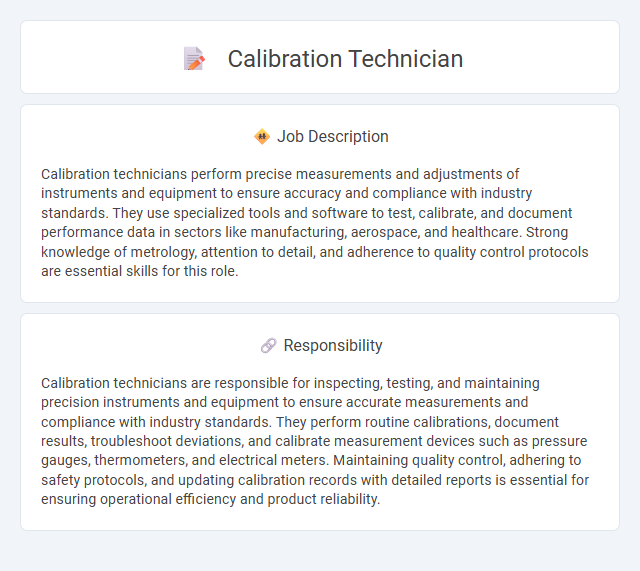
Calibration technicians perform precise measurements and adjustments of instruments and equipment to ensure accuracy and compliance with industry standards. They use specialized tools and software to test, calibrate, and document performance data in sectors like manufacturing, aerospace, and healthcare. Strong knowledge of metrology, attention to detail, and adherence to quality control protocols are essential skills for this role.
Individuals with strong attention to detail and a high level of patience are likely to be well-suited for a calibration technician role. Those who thrive in structured environments and have good problem-solving skills might find this job both engaging and fulfilling. People prone to stress in repetitive or highly precise tasks may face challenges adapting to the demands of calibration work.
Qualification
Calibration technicians must possess strong technical skills in measuring instruments and precision equipment, often requiring a degree or certification in electronics, engineering, or instrumentation. Proficiency in using calibration tools, interpreting technical manuals, and understanding industry standards such as ISO/IEC 17025 is essential. Attention to detail, problem-solving abilities, and experience with data analysis software enhance their capability to ensure accurate measurement and compliance with quality control protocols.
Responsibility
Calibration technicians are responsible for inspecting, testing, and maintaining precision instruments and equipment to ensure accurate measurements and compliance with industry standards. They perform routine calibrations, document results, troubleshoot deviations, and calibrate measurement devices such as pressure gauges, thermometers, and electrical meters. Maintaining quality control, adhering to safety protocols, and updating calibration records with detailed reports is essential for ensuring operational efficiency and product reliability.
Benefit
Calibration technicians likely experience job stability due to the essential nature of their work in maintaining accurate equipment across industries. They may also benefit from opportunities to develop specialized technical skills and enhance their expertise in precision measurement tools. Competitive salaries and potential for career advancement could be other advantages associated with this profession.
Challenge
Calibration technicians likely face the challenge of maintaining precise measurement standards in environments with varying conditions, which may impact equipment accuracy. The need to troubleshoot complex instruments under strict time constraints could require quick problem-solving skills and adaptability. Successfully overcoming these difficulties often depends on staying current with technical advancements and rigorous attention to detail.
Career Advancement
Calibration technicians gain valuable skills in precision measurement and instrument testing, laying a strong foundation for career advancement in quality assurance and technical management roles. Opportunities often lead to positions such as calibration engineer, quality control supervisor, or metrology specialist, supported by certifications like CID (Certified Instrumentation Developer) or ASQ Calibration Technician credentials. Continuous professional development and hands-on experience with advanced calibration equipment enhance prospects for higher salaries and leadership responsibilities.
 kuljobs.com
kuljobs.com